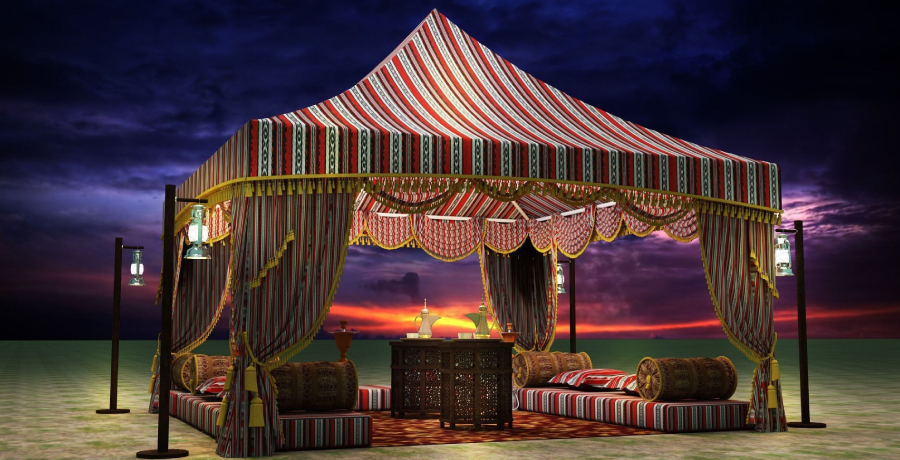Ramadan is a holy month when Muslims globally fast, pray and share meals with loved ones during iftar and suhoor. Renting a tent can effectively create a warm and traditional setting for celebratory gatherings. To ensure a seamless experience, several important details need consideration. This checklist will assist you in organizing party tent rentals and promoting comfort, safety, and unforgettable moments for all guests.
Choosing a Tent for Ramadan
Defining Goals and Requirements
Before renting a tent, it is necessary to determine its main purpose. Different events require different approaches:
Family iftars – small tents with a cozy atmosphere.
Corporate events – spacious tents with banquet furniture and a stage for performances.
Charity dinners – large tents with comfortable seating arrangements for mass gatherings.
Religious meetings – tents with an area for prayer and Quran recitation.
Establish the guest count and the general format of your event. This information will assist you in selecting a tent that fits your needs.
Deciding on An Ideal Venue to Setup Your Tent
Size and Accessibility of the Site
Before renting a tent, ensure that the selected site meets the following requirements:
Sufficient area – the tent should be placed freely with enough space for guests to move comfortably.
Flat surface – important for the tent’s stability and guests’ comfort.
Accessibility for transport – make sure the location is convenient for delivering equipment and food.
Necessary Permits
Some locations require obtaining special permission for setting up temporary structures. Check the municipality’s requirements and arrange all documents in advance.
Creating Comfortable Conditions in the Tent
Cooling and Ventilation
Ramadan often falls during warm months, so it is important to plan a ventilation system:
Air conditioners or fans – help maintain a comfortable temperature.
Open tent sides – ensure natural air circulation in cool weather.
Heating devices – needed if evenings are chilly.
Lighting and Decor
Lighting in the tent plays an important role in creating the atmosphere:
Soft, warm light – helps create coziness.
Arabic lanterns and string lights – add a festive mood.
Decorative fabrics and patterns – emphasize the oriental style of the event.
Candles and lamps – create a romantic effect but must be used with fire safety in mind.
Seating Arrangement and Furniture
Types of Seating
Majlis-style – traditional low seating on cushions around low tables.
Banquet style – long tables with chairs, convenient for large gatherings.
Prayer areas – when organizing religious meetings, it is important to allocate a separate space for prayer.
Furniture and Textiles
Tables and chairs – choose sturdy, comfortable structures.
Carpets and cushions – add coziness and create a traditional atmosphere.
Curtains and drapery – allow adjusting lighting levels and protect from the wind.
Catering and Service
Choosing a Serving Format
Buffet – convenient for large events.
Waiter service – suitable for formal dinners.
Food corners and beverage stations – allow guests to choose dishes to their taste.
Menu for Iftar and Suhoor
Dates and water – traditional foods for breaking the fast.
Light appetizers and soups – for a smooth transition out of fasting.
Main courses – meat, rice, vegetables, and traditional Ramadan dishes.
Desserts and drinks – sweets, teas, juices, and refreshing cocktails.
Cleaning and Waste Disposal
Discuss with suppliers whether post-event cleaning is included in the tent rental. For large gatherings, it is important to organize timely waste disposal.
Entertainment Program
Themed Events
Quran recitation – invited speakers can read verses for guests.
Nasheeds and spiritual chants – create a religious atmosphere.
Video broadcasts – lectures and Islamic films can be shown on large screens.
Entertainment for Children
Workshops and animation – help keep children occupied during the event.
Play areas – safe spaces with soft coverings.
Safety and Technical Issues
Power Supply and Backup Solutions
Access to electricity – ensure the tent can be connected to a power source.
Generator – necessary in case of a power outage.
Water supply and sanitary zones – if the event is long, provide convenience for guests.
Fire Safety
Fire-resistant fabrics and materials – the rented tent must comply with safety requirements.
Fire extinguishers – should be in accessible places.
Emergency exits – consider evacuation routes when setting up the tent.


